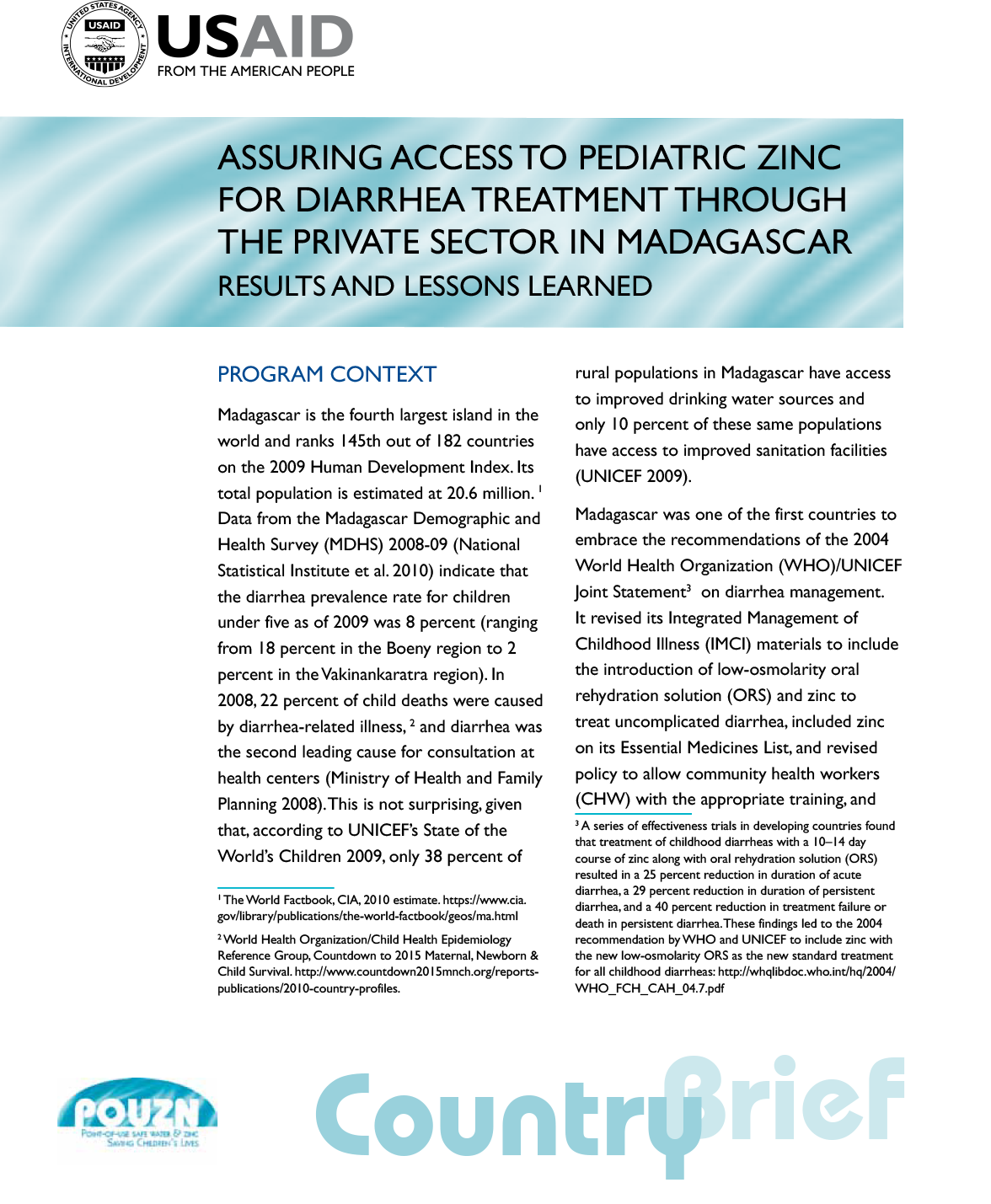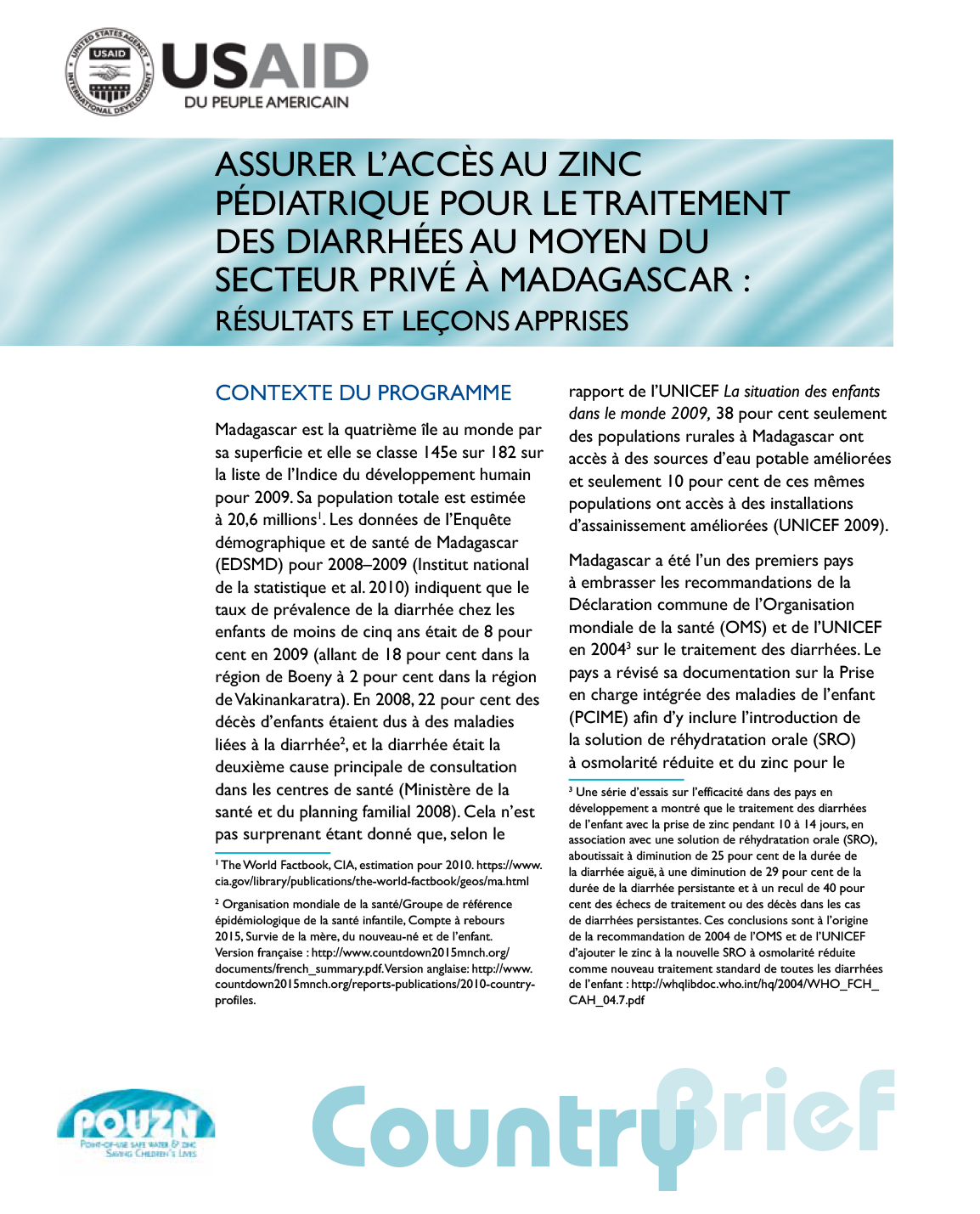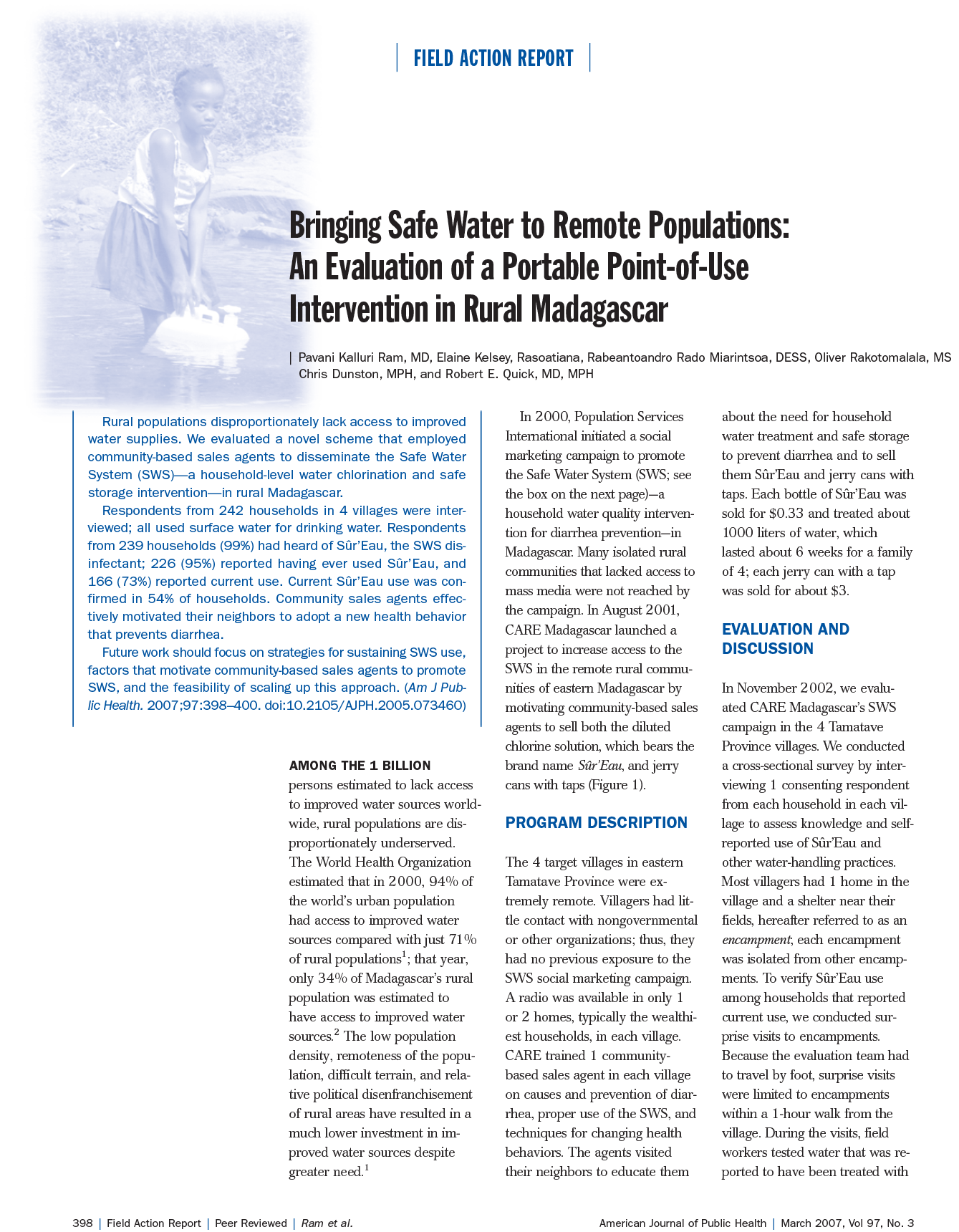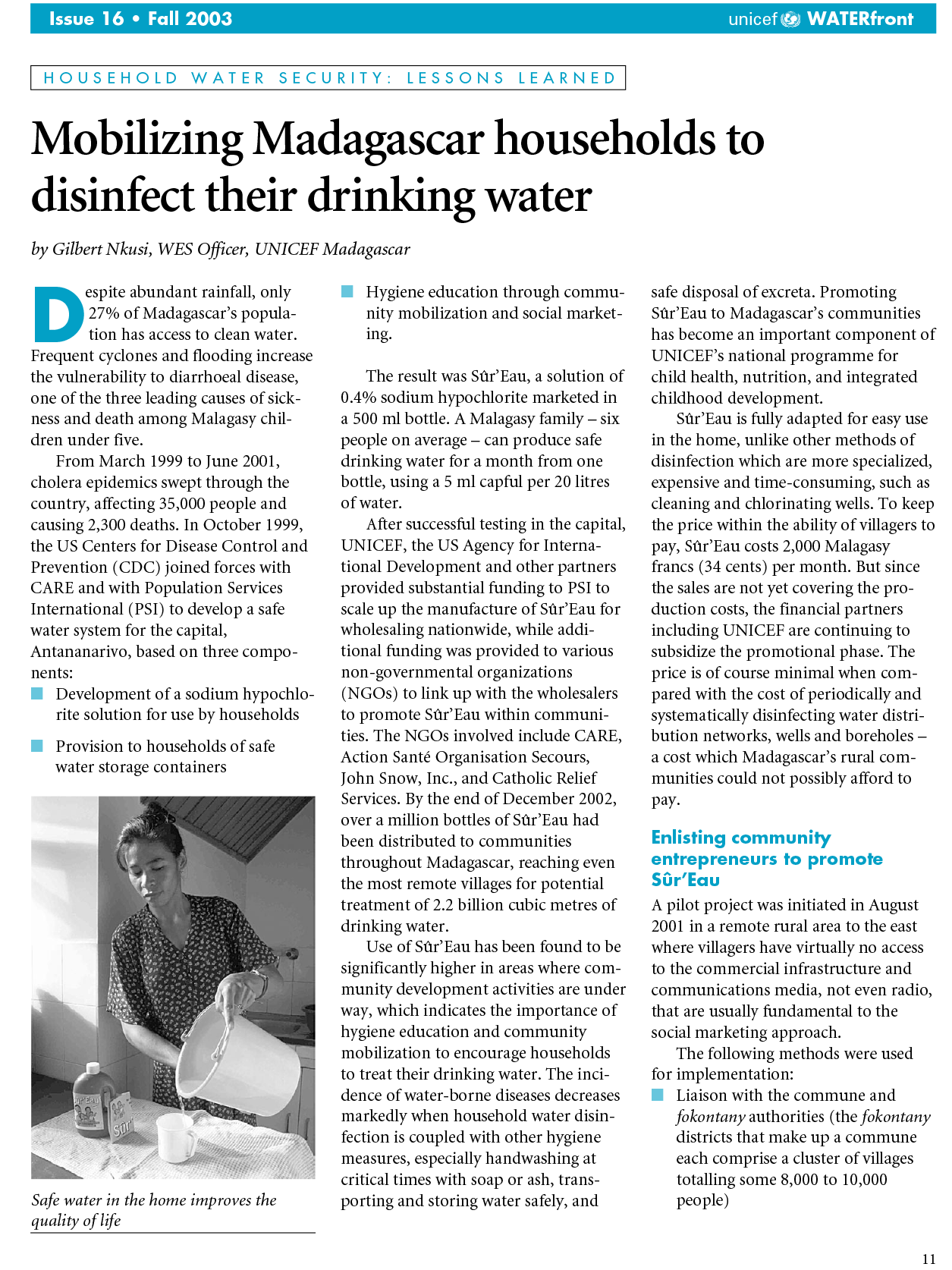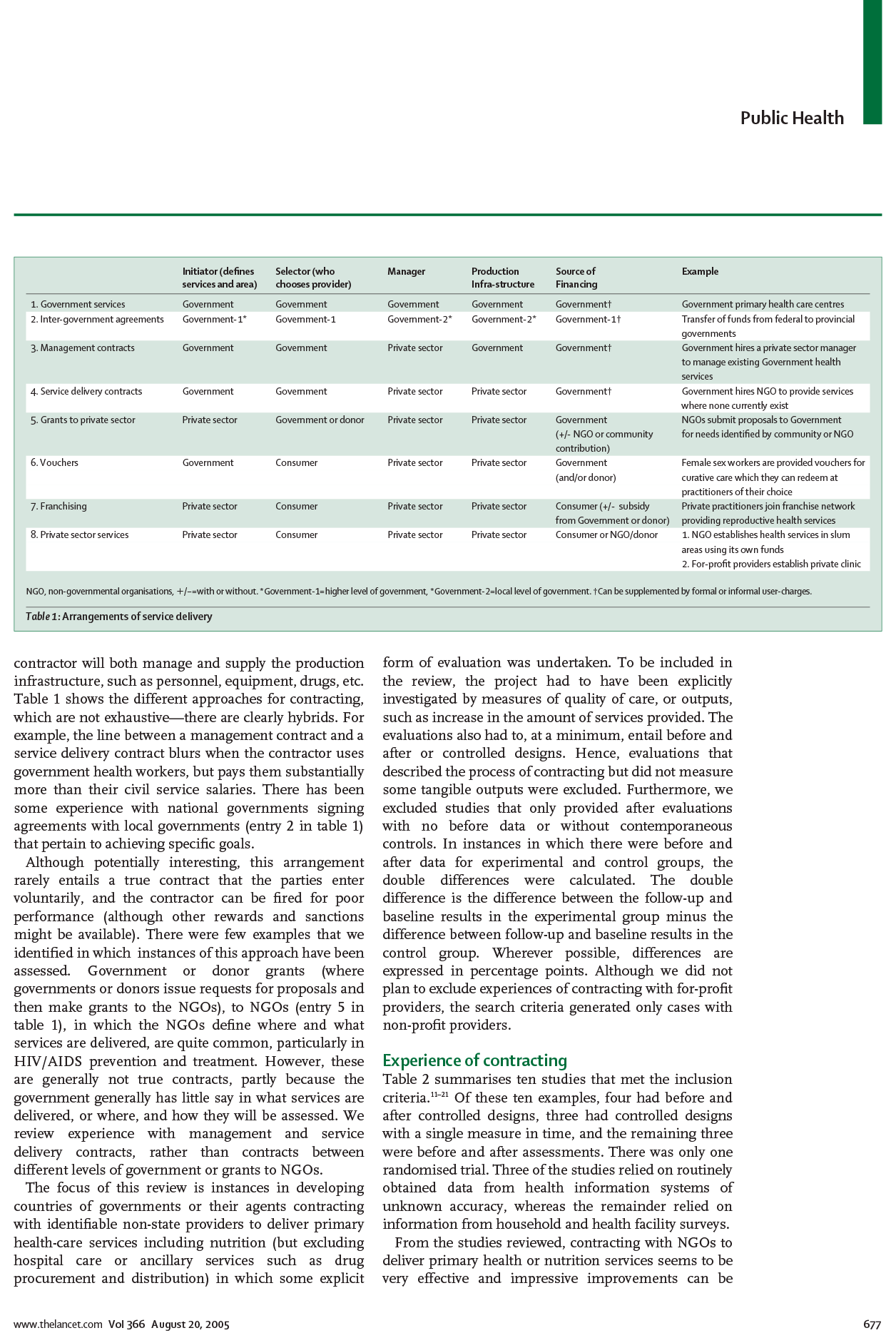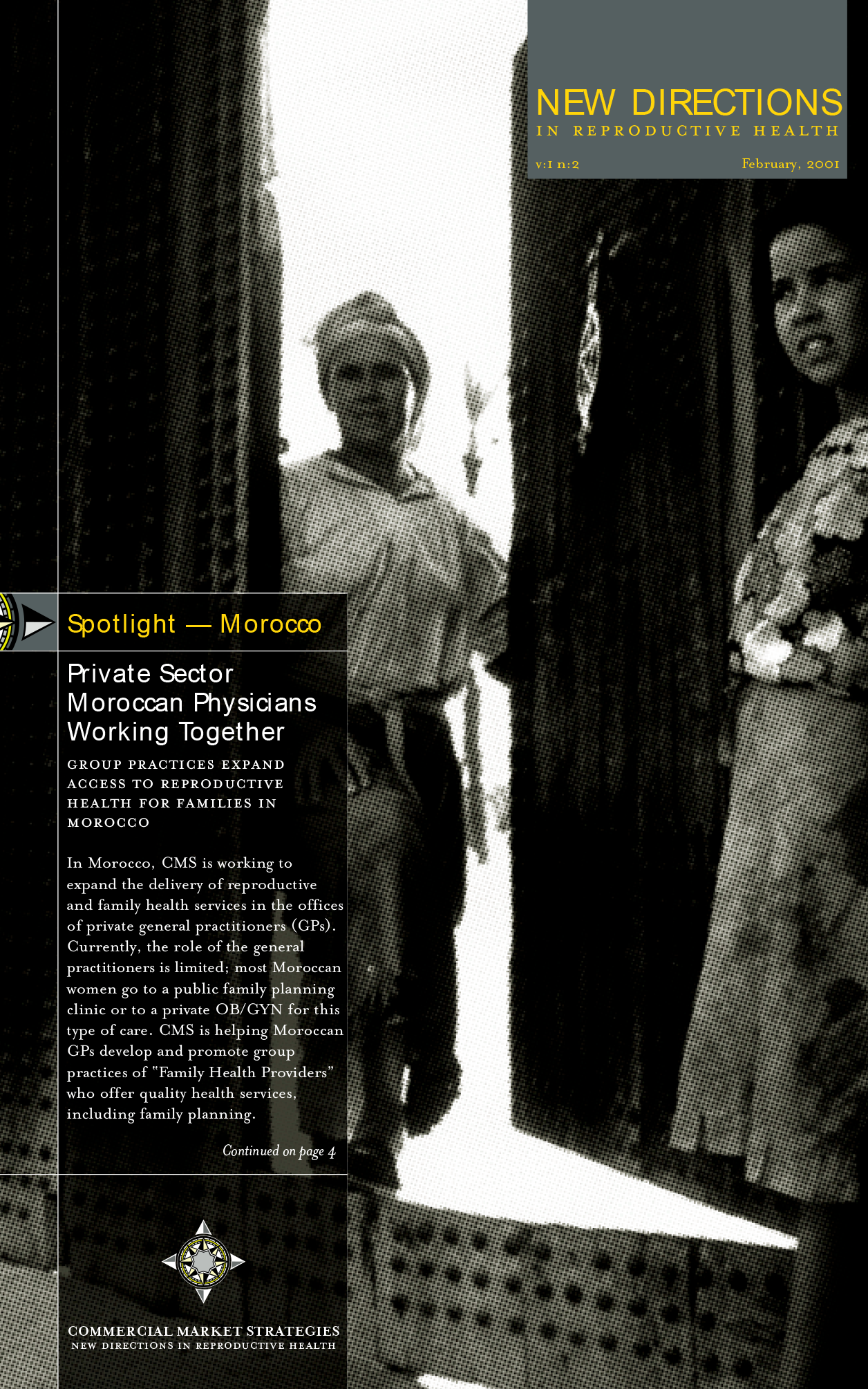
Resource Library
Assuring Access to Pediatric Zinc for Diarrhea Treatment Through the Private Sector in Madagascar Results and Lessons Learned
Madagascar is the fourth largest island in the world and ranks 145th out of 182 countries on the 2009 Human Development Index. Its total population is estimated at 20.6 million. 1 Data from the Madagascar Demographic and Health Survey (MDHS) 2008-09 (National Statistical Institute et al. 2010) indicate that the diarrhea prevalence rate for children under five as of 2009 was 8 percent (ranging from 18 percent in the Boeny region to 2 percent in the Vakinankaratra region). In 2008, 22 percent of child deaths were caused by diarrhea-related illness, 2 and diarrhea was the second leading cause for consultation athealth centers (Ministry of Health and Family Planning 2008).
1 The World Factbook, CIA, 2010 estimate. https://www.cia. gov/library/publications/the-world-factbook/geos/ma.html
2 World Health Organization/Child Health Epidemiology Reference Group, Countdown to 2015 Maternal, Newborn & Child Survival. http://www.countdown2015mnch.org/reportspublications/ 2010-country-profiles.
Resource Type : Brief
Country : Madagascar
Year : 2011-08-03T00:00:00
Language : English
Project : SHOPS

Resource Library
Assurer l’accès au zinc pédiatrique pour le traitement des diarrhées au moyen du secteur privé à Madagascar : Résultats et leçons apprises
Madagascar est la quatrième île au monde par sa superficie et elle se classe 145e sur 182 sur la liste de l’Indice du développement humain pour 2009. Sa population totale est estimée à 20,6 millions1. Les données de l’Enquête démographique et de santé de Madagascar (EDSMD) pour 2008–2009 (Institut national de la statistique et al. 2010) indiquent que le taux de prévalence de la diarrhée chez les enfants de moins de cinq ans était de 8 pour cent en 2009 (allant de 18 pour cent dans la région de Boeny à 2 pour cent dans la région de Vakinankaratra). En 2008, 22 pour cent des décès d’enfants étaient dus à des maladies liées à la diarrhée2, et la diarrhée était la deuxième cause principale de consultation dans les centres de santé (Ministère de la santé et du planning familial 2008). Cela n’est pas surprenant étant donné que, selon le
1 The World Factbook, CIA, estimation pour 2010. https://www. cia.gov/library/publications/the-world-factbook/geos/ma.html
2 Organisation mondiale de la santé/Groupe de référence épidémiologique de la santé infantile, Compte à rebours 2015, Survie de la mère, du nouveau-né et de l’enfant. Version française : http://www.countdown2015mnch.org/ documents/french_summary.pdf. Version anglaise: http://www. countdown2015mnch.org/reports-publications/2010-countryprofiles
Resource Type : Brief
Country : Madagascar
Year : 2010-10-01T00:00:00
Language : French
Project : SHOPS

Resource Library
Bringing safe water to remote populations: An evaluation of a portable point-of-use intervention in rural Madagascar
Rural populations disproportionately lack access to improved water supplies. We evaluated a novel scheme that employed community-based sales agents to disseminate the Safe Water System (SWS)--a household-level water chlorination and safe storage intervention--in rural Madagascar. Respondents from 242 households in 4 villages were interviewed; all used surface water for drinking water. Respondents from 239 households (99%) had heard of Sur'Eau, the SWS disinfectant; 226 (95%) reported having ever used Sur'Eau, and 166 (73%) reported current use. Current Sur'Eau use was confirmed in 54% of households. Community sales agents effectively motivated their neighbors to adopt a new health behavior that prevents diarrhea. Future work should focus on strategies for sustaining SWS use, factors that motivate community-based sales agents to promote SWS, and the feasibility of scaling up this approach.
Resource Type : Report
Country : Madagascar
Year : 2007-03-01T16:30:00
Language : English
Project : SHOPS

Resource Library

PSI Safe Water Treatment, Products and Services
Describes PSI's work in safe water systems and household based water treatment, focusing on projects in Zambia, India, Madagascar, Tanzania and Afghanistan. An excellent summary on the need for home-based water treatment systems and products available to treat diarrhea causing agents.
Resource Type : Webinar
Country : Afghanistan, India, Madagascar, Tanzania, Zambia
Year : 2005-01-01T14:30:00
Language :
Project : SHOPS

Resource Library
Mobilizing Madagascar households to disinfect their drinking water
Describes the program put in place by CDC, PSI with USAID and UNICEF funding, in Madagascar to encourage household-based treatment of drinking water through use of sodium hyposchlorite solution for use by households, provision of safe water storage containers and hygiene education through community mobilization and social marketing.
Resource Type : Other
Country : Madagascar
Year : 2003-09-01T14:15:00
Language : English
Project : SHOPS

Resource Library
Disinfecting Water, Saving Lives
A profile of point-of-use safe water products to prevent diarrhea and improve family health. Describes Safe Water Solution (SWS) and PuR, Purifier of Water and highlights PSI point-of-use water programs in 7 countries.
Resource Type : Brochure/Postcard
Country : Haiti, India, Kenya, Madagascar, Malawi, Tanzania, Zambia
Year : 2005-10-01T12:00:00
Language :
Project : SHOPS

Resource Library
Buying Results? Contracting for Health Service Delivery in Developing Countries
To achieve the health-related Millennium Development Goals, the delivery of health services will need to improve. Contracting with non-state entities, including non-governmental organizations (NGOs), has been proposed as a means for improving health care delivery, and the global experience with such contracts is reviewed here. The ten investigated examples indicate that contracting for the delivery of primary care can be very effective and that improvements can be rapid. These results were achieved in various settings and services. Many of the anticipated difficulties with contracting were either not observed in practice or did not compromise contracting effectiveness. Seven of the nine cases with sufficient experience (greater than 3 years' elapsed experience) have been sustained and expanded. Provision of a package of basic services by contractors costs between roughly US$3 and US$6 per head per year in low-income countries. Contracting for health service delivery should be expanded and future efforts must include rigorous evaluations.
Resource Type : Report
Country : Bangladesh, Bolivia, Cambodia, Guatemala, Haiti, India, Madagascar, Pakistan
Year : 2005-08-20T14:15:00
Language : English
Project : SHOPS

Resource Library
New Directions in Reproductive Health, Spotlight - Morocco
CMS program in Morocco Fighting malaria, Uganda Health financing NGO sustainability, Senegal Adolescent reproductive health, Madagascar Projective technique guides communications campaign, Jordan Summa Foundation — microcredit to private providers in Uganda
Resource Type : Other
Country : Jordan, Madagascar, Morocco, Senegal, Uganda
Year : 2001-02-01T15:15:00
Language : English
Project : SHOPS

Resource Library
Willingness to Pay for Family Planning: Country Applications
Dr. Karen Foreit is a senior felow at Futures Group and is one of the developers of the Willingness to Pay Tool. She co-authored a user's manual on the tool and conducted several projects to use it to make decisions about prices and price changes. Dr. Foreit's presentation to the Willingness to Pay Panel reviews the experiences of the Futures Group's application of the tool in several countries.
Resource Type : Presentation
Country : Madagascar, Mali, Pakistan
Year : 2005-05-16T14:45:00
Language : English
Project : SHOPS

Resource Library
Country Profile: Madagascar
Country profiles are four- to eight-page summaries of CMS's country programs. They provide an overview of the local context and discuss program goals, design, challenges, evolution, and impact.
Resource Type : Other
Country : Madagascar
Year : 2003-10-01T14:15:00
Language :
Project : SHOPS
Pagination
- Previous page
- Page 6
- Next page


